- | F. A. Hayek Program F. A. Hayek Program
- | Expert Commentary Expert Commentary
- |
Daring to Be Different
A 30 Year Celebration of James M. Buchanan Winning the Nobel Prize in Economics
On October 6, 2016, the F. A. Hayek Program for Advanced Study in Philosophy, Politics, and Economics hosted “Thirty Years after the Nobel: James Buchanan’s Virginia Political Economy,” an event featuring Michael Munger, David Schmidtz, Barry Weingast, and Luigi Zingales, who shared their stories of Buchanan and expanded on his work.
I am a proud alumnus of George Mason University’s Department of Economics, where I was taught by James M. Buchanan and witnessed his winning of the Nobel Prize in Economics in 1986. In honor of this 30th anniversary, I’d like to reflect on Buchanan’s research program and his impact on the tradition of public choice and GMU.
I was a graduate student at GMU from 1984 to 1988, and so I was here when the rumors swirled in 1984 that Buchanan would be honored with the Nobel and collectively experienced the disappointment when he wasn’t chosen. At the time, my fellow graduate students and I used that experience to embolden us, as Buchanan always stressed, to “Dare to Be Different.” And, I was here in 1986 when that honor was in fact awarded to him. What a great day that was for Jim and the Center for Study of Public Choice, for the field of political economy, and for GMU; it was a great day for those of us preparing to live an academic life as slightly out of sync economists, the outsiders, or as Buchanan would put it “the great unwashed scattered throughout the academic boondocks.”
It was Buchanan’s great skill to convince all of us that we too could achieve great things in academics while being different from “the eastern establishment” economists of Harvard and MIT if we were just willing to have the work ethic to “consistently apply the seat of the pants to the seat of the chair” and work from 6am to 6pm every day, day after day, week after week, and year after year. Success comes from a strong work ethic and the courage of your convictions, and, as Buchanan also stressed, the courage to withstand the critique of your convictions.
I remember that day — the 16th of October 1986 — like it was yesterday. As the years pass by, people often forget how Buchanan handled the news and, more importantly, how he handled subsequent backlash in some media outlets, such as the New York Times and the Washington Post. First, he was gracious. The first remarks he gave acknowledged the contribution of his long-time colleague and co-author of the classic The Calculus of Consent, Gordon Tullock. Second, he was proud of his humble beginnings. He told all the major newspapers and TV stations that they had to wait until after he did an interview with the Middle Tennessee State Newspaper first. Third, he was courageous in the face of the criticisms and sought to explain his basic insight in as plain a language as possible and to stress the importance of basiceconomic reasoning to understand and inform the world of practical affairs.
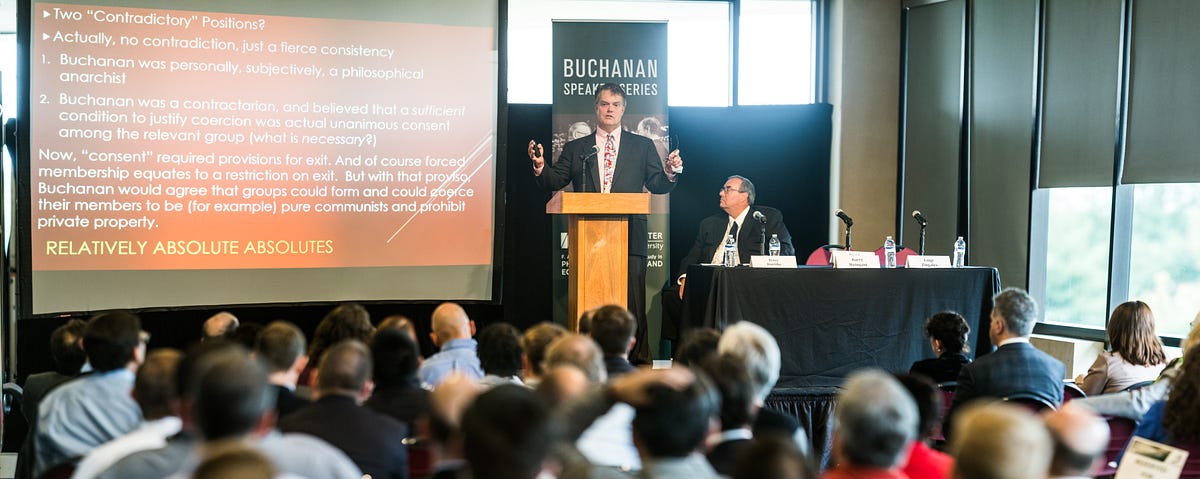
The event we hosted on October 6th celebrated James Buchanan in a way he would have appreciated — with a critical engagement with ideas and a focus on how to constantly improve our understanding of the world. Buchanan was always working on improving his arguments, always revising to improve his exposition, always perfecting his craft as an economist, a political economist, and a social philosopher.
We started with a keynote lecture by Michael Munger, professor in Political Science, Economics, and Public Policy and Director of the PPE Program at Duke University, former President of the Public Choice Society, and former editor of Public Choice. Mike’s work has significantly contributed to public choice and constitutional political economy, including his most recent book Choosing in Groups.
Mike’s lecture focused on Buchanan’s concepts of “politics of exchange” (that politics is fundamentally about people coming together and trying to find solutions that make living together better) and “relatively absolute absolutes” (that propositions can be taken as given while conducting research but still be challenged at other levels of discourse, such as taking constitutional rules as given when conducting research about politics or policy but later studying the formation and choice of constitutional rules). These concepts, Mike argued, are crucial to understanding Buchanan’s research program and life’s work.
Following Mike’s keynote lecture was a panel on the role of philosophy, politics, and economics (PPE) in Buchanan’s work. One of my favorite essays of James Buchanan’s is his “Positive Economics, Welfare Economics and Political Economy” published in the Journal of Law and Economics in 1959. In that essay Buchanan does the careful dance in the social and policy sciences between accepting the discipline of a positive science, the art of applying the lessons of that science to questions of public policy, and acknowledging the philosophical issues associated with any discussion of the appropriate role of government in society. As that essay highlights, Buchanan was not only a technical economist, but also a political economist and a social philosopher.
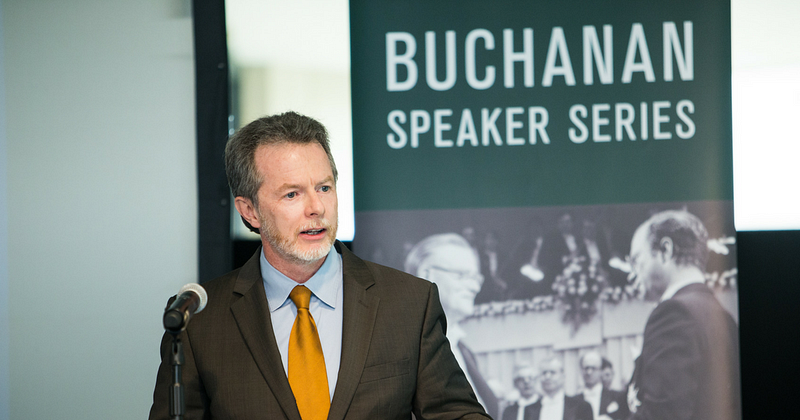
Likewise, in a UVA newsletter, Buchanan describes the foundation of the Thomas Jefferson Center at UVA in the 1950s, states that the center will
strive to carry on the honorable tradition of “political economy”— the study of what makes for a “good society.” Political economists stress the technical economic principles that one must understand in order to assess alternative arrangements for promoting peaceful cooperation and productive specialization among free men. Yet political economists go further and frankly try to bring out into the open the philosophical issues that necessarily underlie all discussions of the appropriate functions of government and all proposed economic policy measures. (emphasis added)
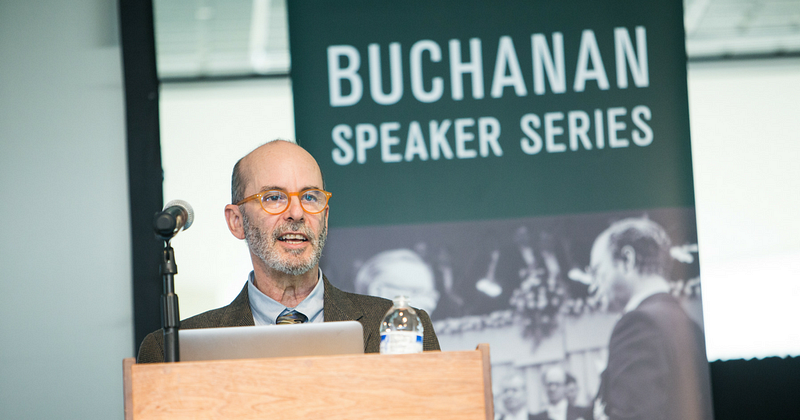
The Hayek Program takes this quote as our educational mission, and we even have it displayed in our offices on the GMU Fairfax campus. We embrace the tradition of PPE and emphasize this in the panel discussion featuring David Schmidtz (the Kendrick Distinguished Professor of Philosophy at University of Arizona and author of The Elements of Justice), Barry Weingast (the Krebs Family Professor Department of Political Science at Stanford University and author of Violence and Social Orders), and Luigi Zingales (the McCormack Distinguished Professor of Entrepreneurship and Finance at the University of Chicago and author of A Capitalism for the People). These distinguished thinkers in PPE discussed the implications of the style of work that Buchanan was critical in initiating in such diverse fields in the second half of the 20th century as law, politics, sociology, history, economics and philosophy.
As the event on October 6th highlighted, Buchanan’s research program was expansive and influential to not just the scholars and students at GMU but to PPE scholars and students around the world. He challenged the status quo, strived to improve and refine his thinking throughout his life, and set an incredible example for other “out of sync” academics. Furthermore, the task at hand is a difficult one but it is worth trudging on. As James Buchanan would say “Onward and Upward.”
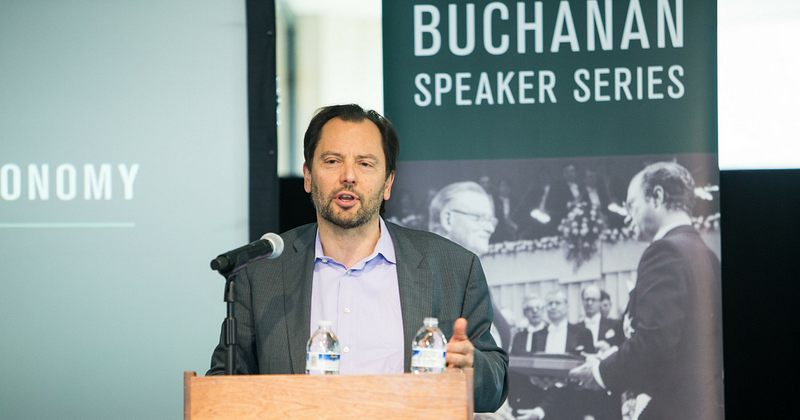
To read Buchanan’s Nobel lecture and other lectures in the mainline tradition of political economy, read our new collection Mainline Economics: Six Nobel Lectures in the Tradition of Adam Smith.
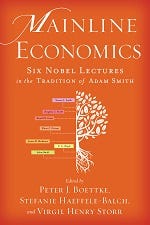
To learn more about the Hayek Program, visit ppe.mercatus.org and sign up here to receive updates on Hayek Program research and events.
If you’d like to take a step further, you can read here about the fellowships and other opportunities available to study the core ideas in political economy through the Mercatus Center.
Peter J. Boettke is the vice president and director of the F. A. Hayek Program for Advanced Study in Philosophy, Politics, and Economics at the Mercatus Center as well as the BB&T Professor for the Study of Capitalism and a University Professor of Economics and Philosophy at George Mason University. He specializes in Austrian economics, economic history, institutional analysis, public choice, and social change.


